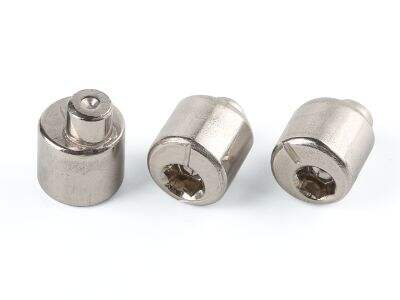Understanding Materials
When selecting screws for your project, the composition of the screws is of utmost importance. The I material will cause the screw to be more firm or I bet it can hold together. Screws are commonly made from a variety of materials, including: stainless steel, brass, and zinc.
Screws made of stainless steel are very strong and unique, which do not rust. That combo phillips square drive screws will make them a good option for outdoor projects or those that would get wet often, such as placed near a pool. They are built tough and are always up for any climate challenges, ensuring the safety and security of your project. In contrary, brass screws are much softer than stainless steel and easily get stripped. Which means if you over-tighten them, they may not stay tight. But brass screws are also really resistant to rust. Because of this they make a great choice for decoration or in areas where you aren’t touching them that frequently. Finally, zinc screws are durable and typically less expensive than the other kinds, but they are prone to rusting. That’s why it’s better to use zinc screws indoors or in dry places where they can stay dry.
Choosing the Right Screw Size
Another important consideration when selecting screws is their size and length. Screws are available in numerous sizes. These custom made nuts and bolts can go from little screws for little things like eyeglasses to huge screws for making things like homes. Choosing the right size screw for your project is extremely important. A screw that is not held correctly or that breaks because it is the wrong size.
When you consider length, ensure the screw is long enough to punch through the material you need to append. It also needs to stick out far enough so you can attach something else to it. But be careful! You don’t want the screw to travel too deep. If it is, it could pierce through the back side of the material and do damage. That might make your project somehow bad, or worse, unsafe.
Screws of the Right Size for Your Project
Some projects require some types of screws, others. For instance, if you build a deck, deck screws are the best for this kind of job. Our screws are rain and snow resistant, ensuring they won’t break down due to hot or cold weather or wet conditions. If you are mounting a shelf on a plaster wall, you may need screws that will avoid cracking the wall. This custom security screws is important because cracks can make the wall ugly and can ultimately cause bigger problems later.
So before you select your screws, consider the materials you are handling, as well as the specific project you are attempting. Note that choosing the wrong screws can not only cause your project to fail, but injury when things fall down or break. Take some time to pick the screws that are best for you!
Tips for Installing Screws
It’s also essential to install them correctly once you’ve selected the right screws for your project. Below are a few tips to consider.
Ensure the proper tools: Use the appropriate screwdriver or drill bit that fits your screw type. The right tool for the job can make things go smoother and safer.
Pre-drill holes: Drilling a hole first is a good idea when working with hard materials, such as metal or hardwood. Having this will assist you in getting the screw in without it being too tight.
Don’t over-torque: It can be tempting to tighten screws until you’ve levered or twisted all of them as tight as you can, but this can actually damage the screw or weaken the material it’s being attached to. You want to ensure the screw is fairly tight but not so tight that it would strip or break.
Use washers: If you are attaching something to a soft material, say wood, and place a washer between the screw head and the material, it also helps distribute pressure. This helps protect the wood and keep everything together.
Common Mistakes to Avoid
At last, a few common pitfalls to avoid when selecting screws for your project:
Selecting the incorrect size: You should always take your time, measure properly, and select the appropriate size and span of screws based on the materials you will be using.
Choosing the cheapest option: It can be tempting to simply select the most affordable screws you can find, but they might not be strong enough or not last long enough to make sense in your project. Invest a bit more on quality screws instead.
Not minding the environment: If you are going to use your project outside or in damp locations, make sure to use rust-resistant fasteners like stainless steel screws. This would ensure that your project would survive longer and remain secure.
If you follow these simple guidelines, you should have no trouble at all finding the right screws for your project and installing them in a way that maximizes safety and security. A lot of very successful people have been where you are now, and can guide you when in doubt. They can often be a great source of insight and suggestions that can level up your project. Your project is bound to turn out great with the correct screws and proper installation!




